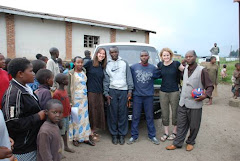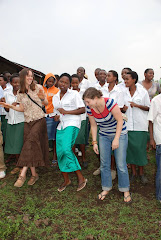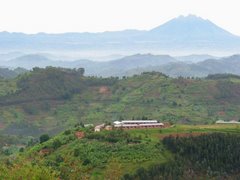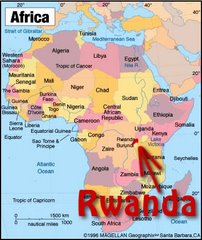Thursday, July 5, 2007
Education in Rwanda
I am in a writing/ reflective/sentimental mood so I will just keep going! I wanted to post a quick note for all of my Passage Charter School (PCS) supporters/students/co-workers. We have visited many schools over the past couple weeks and every time I walk into a class room I am reminded of our little PCS high school and all of the remarkable accomplishments that are achieved by us all. The resilience to overcome past obstacles and the desire to learn that I see amongst the youth here in Rwanda is wonderful reminder of the same qualities that I see at PCS. In other words, being her has once again reminded me what extraordinary rock stars the students of PCS are! I want to try now and paint a picture of education in Rwanda. Some of the schools that I have visited are nice, meaning they have an actual school building, a few chalk-board, and desks for most students; these schools did not have enough bathrooms, no electricity or windows, and they were severely overcrowded. Other schools are in an even more dismal situation. Last week we visited a school in a refugee camp. Most of the students there had grown up in the Democratic Republic of Congo. There parents had fled to the Congo to escape the violence in Rwanda, but when the violence then spread into the Congo, they fled back into Rwanda. The camp was an attempt to help the refugees, but Rwanda is very limited in what it can offer. When I walked into the school here in the refugee camp, I was faced with children who had no shoes, ragged cloths, and runny noses. Yet, they presented us with beautiful singing, dancing, and a creative play on reconciliation after the genocide. They refused to let life take away their song and spirit!
To Congo and Quickly Back
The days and adventures have slipped by! Whirlwind catch-up: travelled to the eastern province for a visit to the African Millennium Village Project (sustainable development in action with less flaws than I expected); wove baskets with a group of women; observed a clinic and saw the absolute desperation for accessible health care, doctors, nurses, and dependable medication; was audience to a play on reproductive health and teen pregnancy; learned about a radio organization that is using a fictional weekly radio soap opera to discuss how the genocide occurred and how to work out some of the underlying cultural and social issues, way cool; went climbing through the hills of western Rwanda; started my service placement with the Fight Illiteracy Youth Organization helping them to create a brochure, magazine, nutrition curriculum, and much more; stayed a night at my second home-stay with a wealthy family who lived far out of Kigali and next to a post-genocide insane asylum, interesting. So many thought and experience to share, but this entry is going to focus on my trip into the Democratic Republic of Congo (DRC).
Gysini, Rwanda is on Lake Kivu and shares a boarder with Goma, Congo. Travel across the boarder is unadvisable, but we organized a guide to take a group of us across for the day. The Rwandan genocide of 1994 is not a closed issue; it has merely spilled over the boarder into Congo. The Hutu militia, Interhamwe, has fled into the DRC and continues to violently target various groups within the Congolese population. Yet, such stories are only a peep in the international media. As we walked across the boarder, I could feel a change in atmosphere. The people were visible upset by our presence and would glare as we walked by. Goma is still in a state of utter disarray ever since the 2003 volcanic irruption. A line runs though the town outlining the destructive lava flow. In addition to the piles of volcanic destruction, the streets were absolutely littered with trash. Amidst the trash, ostentatious homes spotted the streets. The severe separation between economic classes made my stomach turn. A haunting billboard displayed a picture of a Caucasian baby advertising diapers yet the children scampering around on the streets rarely even had shoes or pants. Mercedes sped about the streets and in the driver’s seat was often a male of Indian or Middle Easter descent. The blue-beret UN official that marched around were also mostly from India and the Middle East which I flagged mentally as a further research topic? The UN seems to hold a strong presence, in Goma at least. Countless UN vehicles went back and forth along the main street and a UN sponsored refugee camp was tucked in between the lake and the Rwandan boarder. The condition of the camp seemed to be nice, especially in comparison to the refugee camp we had visited the previous day on the Rwandan side.
I just read a statistic placing Rwanda as the poorest country in Eastern Africa. The level of development in Rwanda is remarkable given socio-political strife but they really have no internal industry. The only substantial export is coffee, yet the country does not have the infrastructure to process and distribute what they grow. Economic development is a priority amongst the entire population. In the case of DRC, it is one of the most resource rich countries in all of Africa and yet it reeks of corruption. Rwanda: violent conflict amongst a population struggling under the weight of severe poverty and resource scarcity; Congo: violent conflict amongst a population cursed with resource abundance. There is so much I have to say, all for now though.
Amahoro (Peace)
Gysini, Rwanda is on Lake Kivu and shares a boarder with Goma, Congo. Travel across the boarder is unadvisable, but we organized a guide to take a group of us across for the day. The Rwandan genocide of 1994 is not a closed issue; it has merely spilled over the boarder into Congo. The Hutu militia, Interhamwe, has fled into the DRC and continues to violently target various groups within the Congolese population. Yet, such stories are only a peep in the international media. As we walked across the boarder, I could feel a change in atmosphere. The people were visible upset by our presence and would glare as we walked by. Goma is still in a state of utter disarray ever since the 2003 volcanic irruption. A line runs though the town outlining the destructive lava flow. In addition to the piles of volcanic destruction, the streets were absolutely littered with trash. Amidst the trash, ostentatious homes spotted the streets. The severe separation between economic classes made my stomach turn. A haunting billboard displayed a picture of a Caucasian baby advertising diapers yet the children scampering around on the streets rarely even had shoes or pants. Mercedes sped about the streets and in the driver’s seat was often a male of Indian or Middle Easter descent. The blue-beret UN official that marched around were also mostly from India and the Middle East which I flagged mentally as a further research topic? The UN seems to hold a strong presence, in Goma at least. Countless UN vehicles went back and forth along the main street and a UN sponsored refugee camp was tucked in between the lake and the Rwandan boarder. The condition of the camp seemed to be nice, especially in comparison to the refugee camp we had visited the previous day on the Rwandan side.
I just read a statistic placing Rwanda as the poorest country in Eastern Africa. The level of development in Rwanda is remarkable given socio-political strife but they really have no internal industry. The only substantial export is coffee, yet the country does not have the infrastructure to process and distribute what they grow. Economic development is a priority amongst the entire population. In the case of DRC, it is one of the most resource rich countries in all of Africa and yet it reeks of corruption. Rwanda: violent conflict amongst a population struggling under the weight of severe poverty and resource scarcity; Congo: violent conflict amongst a population cursed with resource abundance. There is so much I have to say, all for now though.
Amahoro (Peace)
Subscribe to:
Comments (Atom)





